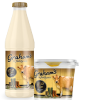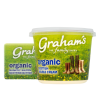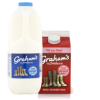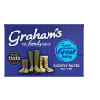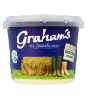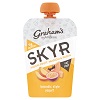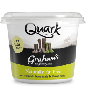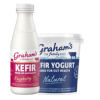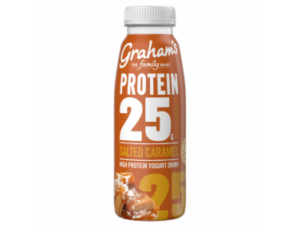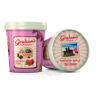
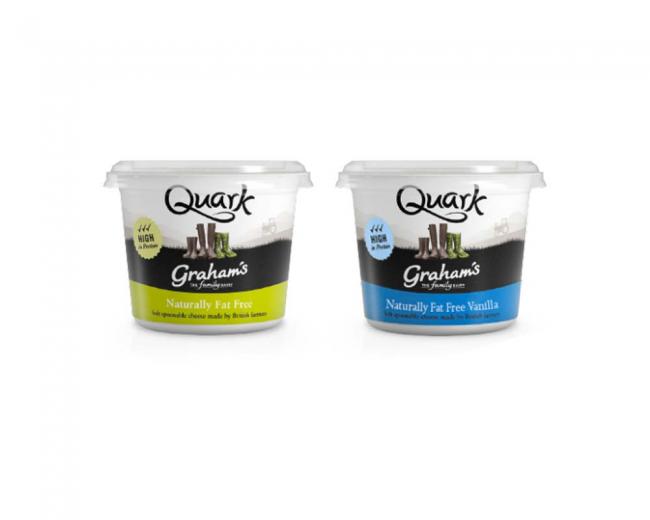
What actually is Quark and what can you do with it?
One of the most exciting things we’ve been involved with this year has been the launch of Graham’s Quark, in both Natural and Vanilla flavours. Understandably, we’ve had a fair few questions about the product, so we thought we’d take the opportunity to answer some of them here.
What is quark?
This has been the question we’ve heard most often and it’s actually a fairly simple one to answer.
Quark is a fresh dairy product that would be classified as a cheese. It’s a spoonable soft cheese though and has a mild enough flavour that it can be used in either sweet or savoury dishes.
How do we make quark?
We start with pasteurised skimmed milk, which then undergoes acidification using lactic acid culture (the kind that good gut bacteria works on). Once the product has reached the desired pH level, we start to send it through the ultrafiltration plant. This drags and concentrates the protein (casein and whey) found in the acidified milk, leaving it separated from the water, most of the salts and the lactose. This concentration is why quark is such a high protein product.
What’s quark actually like though?
We know – until you’ve tried it – it can be difficult to imagine (which is why we’ve been out and about at so many events, like the Highland Show, letting people sample it), so it might help if we give examples of some similar products.
Is it like cottage cheese? Well, yes and no. Cottage cheese has more solid pieces of curd through it whereas quark is, as we’ve said, spoonable and soft. Is it like fromage frais? Yes… kinda. There’s a similarity in terms of texture but quark is higher in protein, lower in fat and lower in sugar.
Quark’s not a yogurt, (technically it’s a soft cheese) but you can use it in many of the ways that you might use a thick yogurt. Really though, the best way for you to get to know quark is to try it and have fun experimenting with it.
Quark is quark.
Why haven’t I heard of quark before?
Quark has been a popular product in Central Europe – particularly Germany – for hundreds of years. The word is recorded as being in use there as far back as the 14th century, and possibly even as early as Roman Times. The Roman historian Tacitus even mentions the Germanic people eating a kind of ‘thick milk’, which some believe may have referred to quark.
It’s only recently that its popularity has spread to the UK though – something we aim to grow even further! Once you go quark, you don’t go ba…rk? Well, anyway, we’re sure it’s a product you’ll fall in love with once you try.
How is quark pronounced? Should it rhyme with work or park?
Well, as we’ve said, the word comes from German but before that it probably has its roots in a Slavic language – for example in Poland the word for curd cheese is twaróg, while in the Czech Republic and Slovakia curd cheese is known as tvaroh.
In German and in Slavic languages, the ‘a’ would be pronounced as in ‘park’, so we’ll go with that. However, should you wish to rhyme it with ‘work’ then we won’t fall out about it. One of our signs at the Royal Highland Show let people proudly declare that they were ‘quarking 9 to 5’ so we’re happy to let you decide.
Why should I be eating quark?
These days we’re all looking for ways to stay healthy and feel fuller for longer. Quark is the perfect product when it comes that. It’s both naturally low in fat and high in protein. Not only is protein what your body needs for building muscle, it also gives you that feeling of being fuller for longer – helping you resist temptation in the form of snacks.
What’s the easiest way to start using quark?
Quark can also slot in your current daily habits. Think of how you use Greek Yogurt – are you adding it to cereal or enjoying it with fresh fruit and honey? Why not try using quark instead? It’s lower in fat and higher in protein than Greek Yogurt.
Quark’s versatility also means that it can be used at any mealtime across sweet or savoury dishes. We’ve got a variety of fantastic quark recipes on our site from the likes of Nick Nairn and Flora Shedden.
What does quark have to do with physics?
Ah, yes, we thought you might get to that! We can confirm that when we’re talking about quark we’re talking about tubs of delicious dairy goodness and not about elementary particles that combine to form composite particles known as hadrons. The two things just happen to share the same name!
Click here to find out where you can purchase Quark.

